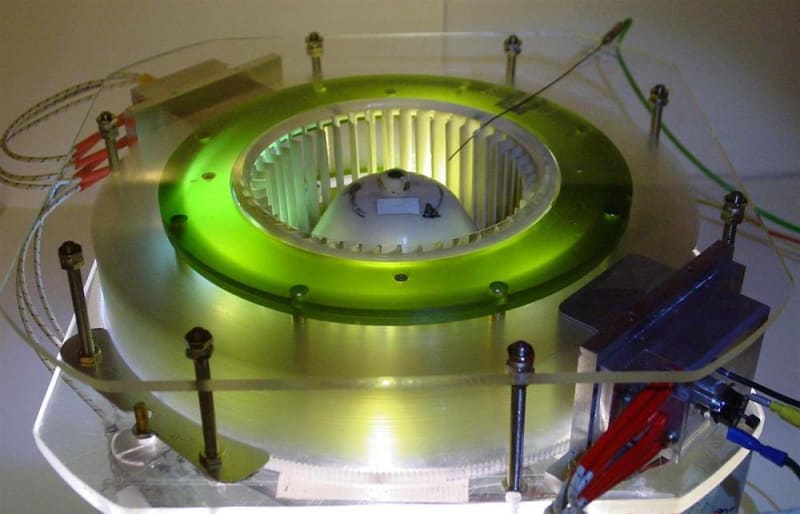
This invention relates to cooling devices which maintain the correct operating temperature for computer processors. The devices use the relatively new FASTT technology to enable high flux cooling of processor chips without the use of liquids.
Heat pipes have provided a relatively simple method of increasing the cooling flux from computer processors, but suffer from large cumbersome pipe/finning sections to achieve dissipation to ambient air. Liquid cooling systems allow more flexible positioning of the large output, air blast cooled section, but long term integrity of pipework jointing and coolant maintenance can be issues. FASTT technology offers an alternative cooling scheme which does not rely on the use of liquids, and in which the heat transfer medium also serves as the output sink surface.
FASTT is an acronym for Foil And Slot Thermal Transfer and refers to the use of solid precision thin foils running through slots of thermally conductive material. Heat is transferred through conduction from the slot walls to the moving foil which then exits the slot to enter a region where the foil convectively rejects the heat through normal air cooling. The use of solid material for heat transfer has a number of advantages over the use of gases , vapours or liquids, these include : linear response – no critical heat flux, high input flux capability, heat transfer medium which is self-containing , no freezing or boiling issues, no need for exotic or hazardous materials, very wide operating temperature range.
Two forms of FASTT devices have been identified, constructed and tested, namely the rotary and the linear forms. The linear form device has achieved greater than 135 Wcm-2 flux at 70C temperature differential, with predicted performance to greater than 250 Wcm-2 flux. The accompanying sketches and photographs give additional detail. The prototypes have been constructed to allow visual as well as instrumentation access, and do not represent the best production form. It is anticipated that reduction in mass may be an additional feature simply due to the surface area to mass ratio possible by using polymeric foils.
It is believed that although traditional desktop personal computers may not be the preferred format for computing in the future, it is likely that there will be a continued need for local high end computing power in some form for industrial and commercial uses such as in robotics and design. The needs of security of process, over centralised computational power, may well ensure that localised, isolated, high end processing will continue to be an important market. There should thus be a continued need for high heat flux cooling, particularly if it avoids the use of liquids with their attendant issues.
This entry has been placed in the Electronics/Sensors/IoT section, however, FASTT technology will have applications in both cooling and heating applications in many other markets. The aerospace and automotive sectors are currently being examined for low mass heat exchanger, and thermal storage applications.
Video
-
Awards
-
 2017 Top 100 Entries
2017 Top 100 Entries
Like this entry?
-
About the Entrant
- Name:William Alexander
- Type of entry:individual
- Software used for this entry:FEMAP CAEFEM TURBOCAD EXCEL JustBASIC
- Patent status:pending








